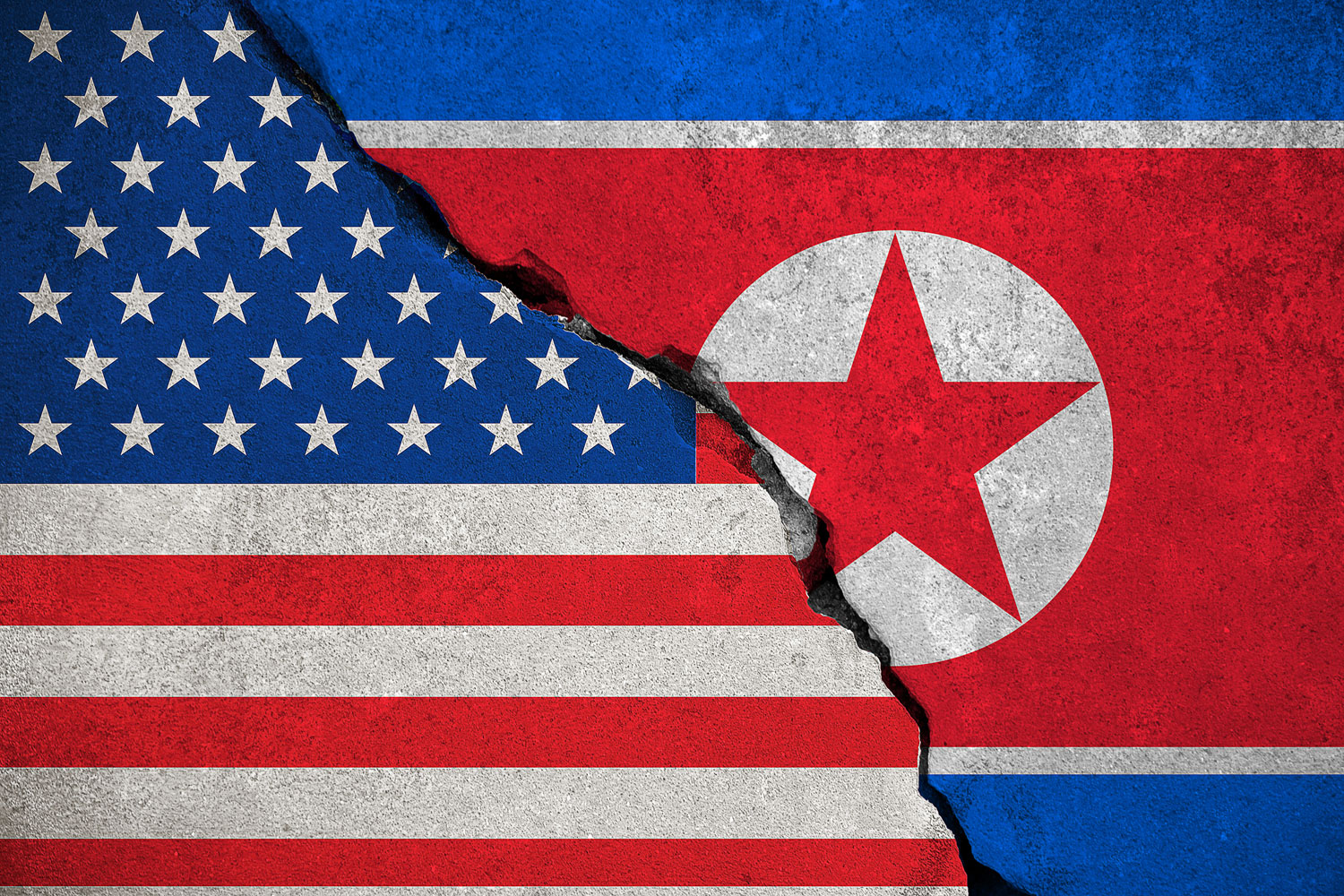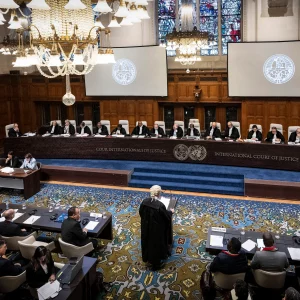Editors’ disclaimer: this debate was crafted during early 2018, before the development of new events between North and South Korea’s possible peace treaty that would formally end the Korean War. The contents discussed in the debate below ought to be evaluated as if such a groundbreaking event has yet to occur.
RESOLVED: The United States should substantially increase its diplomatic engagement with the Democratic People’s Republic of Korea.
Affirmative Constructive Speech (Hyungil Shim)
Since the election of President Trump, relations between the United States and the Democratic People’s Republic of Korea (DPRK) have been tested to say the least. The back-and-forth playground insults from both leaders, North Korea’s continued missile and nuclear tests, and classified military exercises by the U.S. military have revived international worries of an impending war not seen since 2010, when North Korean artillery attacks killed two South Korean marines. The Winter Olympics, during which the two Koreas celebrated under a unified flag and gave rise to diplomatic talks, seem to have relieved tensions for now. Although the future of North Korea is unclear, there is one thing to keep in mind as the U.S. and South Korea continue to tackle the hermit kingdom’s nuclear program: diplomacy is only viable solution.
As a brief aside, it must be established that despite Trump’s rhetoric, Kim Jong-Un is a rational leader. Like all dictators, he must keep some people happy to maintain his authoritarian power and ensure the continued existence of his regime. His rationality, then, means that there is at least a possibility that he will negotiate with Washington.
U.S. efforts in the past few decades have been to stop the North Korean nuclear program, only to be met with coy compliances that resulted in North Korea giving up a tiny bit and gaining much more. The Agreed Framework of 1994 is a great example: North Korea froze its nuclear facilities at Yongbyon, only to covertly continue its nuclear technology efforts and eat up the $400 million to be used in energy assistance programs provided by the U.S. If history has shown us anything, North Korea will never give up its nuclear arsenal. Continued efforts to denuclearize North Korea and international ignorance of North Korea as a nuclear state have only frustrated both sides, and must come to a stop for the time being. Denuclearization should always be the long-term goal, but for now, diplomatic talks only need to de-escalate tensions and ensure temporary peace because those are the only realistic goals. Ensuring even a short period of peaceful talks is a win for diplomacy.
Increased diplomatic engagement spearheaded by the U.S. would also curb Russian efforts of establishing itself as peacemaker in Asia in order to undermine U.S. global influence. In recent months, the Kremlin has supported peaceful talks between the U.S. and North Korea by backing China’s “dual freeze proposal” as well as reaching out to U.S. allies to convince the Trump Administration in agreeing to the proposal. Russian-led negotiations would undermine the influence of the United States as a world power and compromise its legitimacy as a global champion for peace. U.S. as a hegemon cannot proclaim and enforce world peace while also bullying any state that refuses to cooperate under its guidelines; it incentivizes states to not engage diplomatically if they assume the United States will only resort to unilateral economic pressure or military action. This attack on U.S. legitimacy, in turn, asserts Russia as a more favorable side to turn to. And if the conflicts in Syria or Ukraine have shown anything, it is that Russia is more willing to resort to military action to protect its interests, not less. Thus, the U.S. must increase its diplomatic engagements with North Korea to not only ensure peace today, but also to secure peace in the future.
Cross-Examination of the Affirmative by the Negative
EH: Is the cooling of relations between the South and the North in the U.S.’s best interest?
HS: No. South Korea is an important ally in the Pacific region that is backed by the U.S. military. If tensions between the two Koreas rise, it risks the U.S. being drawn into a conflict that it did not even start.
EH: You claim Kim Jong-Un is rational. Is he really? Why does it even matter?
HS: Yes. There has been a consensus among U.S. military and intelligence personnel that Kim is a rational actor. He understands that an attack against the U.S. or allied forces means an obliteration of his regime and country. His rationality means that a diplomatic agreement is possible.
EH: What makes you think pragmatic diplomatic discourse with the DPRK is probable, under current circumstances?
HS: Both the United States and North Korea seem willing to talk of peace agreements as evident by Trump and Kim agreeing to meet at a summit.
EH: Would Russia leading negotiations provide any more of a chance of de-escalation in the region?
HS: No. Despite it being on friendlier terms with North Korea, Pyongyang will never release its nuclear weapons. Russian intervention in the Korean Peninsula will likely see it either attempting to use North Korea as a battering ram with which to hurt U.S. interests in the region, or just more volatile measures to get North Korea to behave which further destabilizes the country.
Negative Constructive Speech (Eric Heidel)
Mr. Trump’s decision to signal interest in diplomatic engagements with the Democratic People’s Republic of Korea, as a result of increased hostilities between the two nations, would culminate into a diplomatic catastrophe and severely impair U.S. operation capacity in the Asiatic Pacific if the Trump Administration indeed proceeds with the engagement.
The de facto leader of the DPRK, Kim Jong-Un, rose to power on December 17, 2011 with the death of his father, Kim Jong-Il. Throughout his reign, nuclear weapons have defined Mr. Kim’s rule; in 2017, a plethora of tests has strained its diplomatic relations with the U.S.
However, Mr. Trump should not partake in an opening of diplomatic relations. First, Mr. Trump is not the first U.S. leader to propose diplomatic actions, yet, not one of the other diplomatic engagements thus far attempted were successful. The Agreed Framework is actually an argument for the Negative. When the deal failed, the U.S. was forced to build an ABM site in Alaska in 2002, which violated its nuclear arms reduction treaty with Russia. In the United States’ attempt to pursue diplomatic engagements with the DPRK, we exacerbated diplomatic struggles with other nations and put our national security further at risk.
In addition to prior failed diplomatic actions, under current U.S. foreign policy, the U.S. is slowly losing its legitimacy in the Asia-Pacific, with China posing a significant threat to our hegemonic power in the region. It is imperative that the U.S. prove its ability to defend her allies in the region. The U.S. must therefore assert its authority in the region by demonstrating a hard power response to both China and the North. Our current passivity, combined with diplomatic engagement from a position of weakness in the region, will invite Mr. Kim to attempt to force inconceivable concessions from U.S., such as a withdrawal of our forces in South Korea or Japan.
However, a significant issue must be addressed with respect to South Korea. The growing wedge propagating between the South Koreans and the United States threatens our ability to operate effectively in the region. The impeachment of Park Geun-hye last March ended a period of strong ROK-U.S. cooperation, made evident by the installation of THAAD. Unfortunately, current President Moon Jae-In does not share Ms. Park’s pro-U.S. stance, and his desire for negotiations with the North has seriously undermined U.S. operations in the region. Therefore, it is imperative that the U.S. restore relations with the South either through economic incentives or other means without negotiating with the North for the reasons ascribed above.
Finally, I do not advocate for military action. A war with North Korea is unsustainable, and detrimental; yet acquiescing to their demands is not only foolish, but dangerous. Therefore, deterrence with hard military power, pressure on China to coax North Korea, and re-warming of relations with the South are all essential for U.S. foreign policy in the region. Direct engagement with North Korea is not the answer.
Cross-Examination of the Negative by the Affirmative
HS: Why did historic agreements between the United States and North Korea fail?
EH: The Agreed Framework of 1994 failed due to Pyongyang’s pursuit of non-civilian uranium enrichment, which led to a series of disagreements that ultimately led to North Korea pulling out of the agreement and blatantly pursuing nuclear weapons. The Six Party Talks in the mid-2000s failed similarly due to North Korea’s refusal to cooperate with the terms of engagement.
HS: Peaceful negotiations are at the heart of diplomacy; how will increasing these negotiations with North Korea tarnish U.S. diplomatic positions?
EH: North Korea doesn’t want negotiations, but survival. Insofar as they believe the U.S. is an existential threat, they will never agree to concessions absent a massive loss from Washington. Either way, diplomatic engagement will inevitably fail, which doesn’t help Washington’s reputation.
HS: How are President Moon’s negotiations with North Korea undermining U.S. operations in the region?
EH: It’s clear that Moon is less willing to fall in line with the U.S. like Park was. Kim has capitalized on this to drive a wedge between the U.S. and South Korea. North Korea’s warming towards its neighbor (like its united flag in the Winter Olympics this year) is not an optimistic sign, but merely a ploy to distance the U.S. away from the Peninsula.
HS: North Korea has rarely responded well to U.S. military deterrence. Why will it be successful in de-escalating tensions now?
EH: De-escalation isn’t the priority; preventing catastrophic escalation is. North Korea has misbehaved, but it has yet to unleash a devastating attack, and I argue that this is because it knows that such a move is tantamount to suicide. Both our allies and enemies must be certain that the U.S. will come to its allies’ aid in order to maintain regional influence.
Affirmative Rebuttal (Hyungil Shim)
The Agreed Framework of 1994 was a failure; however, the “failures” of the past still successfully delayed North Korea’s rise to nuclear power and guaranteed a period of de-escalation and peace. The same is true today. Even if diplomatic talks fail to even partially de-nuclearize North Korea, peaceful communication between Washington and Pyongyang will provide relief not only for South Koreans, but also for the rest of the world.
No nation questions the strength of the U.S. military. There are U.S. military bases in both Japan and South Korea, stationed by tens of thousands of U.S. troops, and numerous joint military exercises that involve U.S. ground, air, and navy personnel. There is no doubt about the United States’ ability to protect itself and its allies. But even if the current U.S. presence is insufficient, increasing U.S. involvement solves nothing. The Kim regime rarely reacts peacefully to U.S. military presence, as evident by the numerous acts of belligerence, peaking in 2010. Deterrence will only provoke Kim to act more violently and push it harder towards nuclear weapons.
My opponent also states his concern with an increasingly bigger wedge between South Korea and United States over North Korean relations. Yet President Moon’s party has always been turned off by perceived overreach of influence by Washington. An increased U.S. presence, military or not, will only push this wedge deeper.
The most important factor of this debate, however, lies in relations outside of the Peninsula. Even if a hard military approach reasserts U.S. hegemony and undermines Chinese and North Korean influence in the region, it will only feed into the narrative of America as the aggressive world police force and fuel anti-American sentiments globally. It will turn foreign players away from the U.S. and towards powers like Russia. Although diplomatic engagements might allow China to exert its influence in the region freely, it will more importantly maintain the United States’ moral superiority over the region and away from Russia. China is not propping up a foreign regime that has used chemical weapons on its citizens. China is not violently annexing parts of a sovereign nation, and China is not meddling in our elections. Russia is a larger and more imminent threat and thus must be dealt with immediately.
The future of North Korea is complicated, and quick solutions are available. But it is important for Washington to learn from its mistakes and approach the solution with prudence. Solutions to decades of conflict cannot—and should not—be solved within months. A satisfactory solution can only be crafted with careful deliberations and negotiations so that it may endure both time and politics as well as ensure lasting peace.
Negative Rebuttal (Eric Heidel)
As tensions continue to mount between the United States and DPRK, it is important that we do not engage in diplomacy with the DPRK. An attempt by the United States to engage in diplomacy would only repeat the mistakes of the past; it was because of the mistakes that the DPRK was finally able to achieve their goal of becoming a nuclear power. The United States cannot afford to make those mistakes again. While the affirmative argues that realistic goals can be set, prior and repeated actions by the North Koreans have proved otherwise; we must not place our faith in those we cannot fully trust.
The United States must continue its current trend of hard deterrence in the region while rebuilding our relationship with Seoul. The resulting military and economic actions against North Korea would demonstrate to the world that states who pose a threat to U.S. interests and allies abroad will not be tolerated; this is something that has been lost in recent U.S. foreign policy. The U.S. is on a trend of reduced strength globally: the failure in Iraq and Afghanistan, the rise of China and a resurgent Russian state meddling in our election all prove this. The situation with North Korea begets an opportune time to once again play hardball to re-establish its credibility on the global scale.
Fears of a resulting war with Kim are unfounded. Under the assumption of rationality propagated by the affirmative, Kim would not engage in a war that would surely lead to the end of his regime. However, that remains true if and only if we have the military deterrent set in place. In the coming future, it remains to be seen whether or not the DPRK will ever surrender their nuclear weapons; however, in the present, U.S. policy centered on diplomatic engagement with the DPRK is fallacious at best and catastrophic at its worst.
Featured image source: Getty Images






Be First to Comment